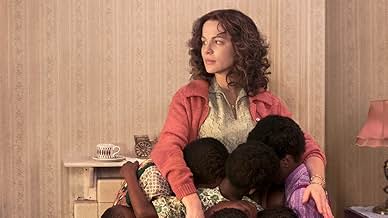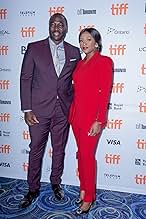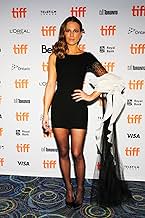CALIFICACIÓN DE IMDb
6.2/10
2.5 k
TU CALIFICACIÓN
Un joven nigeriano es entregado por sus padres a una familia británica con la esperanza de un futuro mejor. En cambio, se convierte en el temido líder de una banda de cabezas rapadas blancas... Leer todoUn joven nigeriano es entregado por sus padres a una familia británica con la esperanza de un futuro mejor. En cambio, se convierte en el temido líder de una banda de cabezas rapadas blancas.Un joven nigeriano es entregado por sus padres a una familia británica con la esperanza de un futuro mejor. En cambio, se convierte en el temido líder de una banda de cabezas rapadas blancas.
- Dirección
- Guionista
- Elenco
- Premios
- 3 premios ganados y 3 nominaciones en total
- Dirección
- Guionista
- Todo el elenco y el equipo
- Producción, taquilla y más en IMDbPro
Opiniones destacadas
In the early 1990s while dinning in an African restaurant in Los Angeles, I bumped into Adewale - he'd heard my English accent as I spoke with my West African wife and struck up a conversation. We exchanged numbers and agreed to meet up again having mentioned our mutual interest in the movie industry. He was just breaking into Hollywood and I fancied myself a screenwriter.
Adewale shared the phenomenon of 'farming the children,' recounting his own experiences under that abdication of parental responsibility. Since we're both Londoners of similar age we shared stories of our youth in the late seventies. I spent that period of my life deeply immersed in the British punk rock scene, itself a hub for the skinhead and mod revivals. I have no recollection of Adewale mentioning his peculiar involvement in a gang of ultra-violent white racist skinheads during this era; perhaps shame dictated he avoid speaking of such an astonishing episode in his life.What I do know is that his movie's portrayal of nineteen-seventies white working-class English people and of the subcultures of their children is absurdly cartoonish and trite.
The neo-Nazi, psycho-skin trope has been a reliable contemporary Hammer Horror-like monster which 'Farmed' disappointingly enjoins. It's unfortunate since this era's youth is redolent with story lines worth telling - and worth telling accurately. The working-class English who lived during that time are a kaleidoscope of characters and attitudes worthy of honest examination as are their interactions with immigrants and their English-born children. To portray them as generally bigoted, oafish, humourless and hyper-aggressive is to indulge a stereotype no less insulting than the black pimp or the inscrutable Asian.
Nigerian farmed children have unique and lamentable stories, but for me this film failed to capture the emotional complexity and profundity of the arrangement due to heavy-handed poetic license of the writer/director.
Those negative reviews for this movie are a joke. People need to leave their personal feelings and viewpoints out of it when they are reviewing a movie. And those petty enough to call the director out as a "liar," claiming "this never happened" nonsense is equally ridiculous; it's a movie, created to entertain and or educate. Who cares if it's fact or fiction? The people with this complaint probably believe that Hollywood trash like "Pearl Harbor" is not mostly fiction. On to the technical aspects of this movie, (something that actually matters), "Farming" is a beautifully, artfully shot slice of eye candy, which is ironic considering the grotesquely ugly themes of this difficult movie. Kate Beckinsale is utterly believable as the Cockney speaking Londoner who brings extra cash into the house by raising the Nigerian children left in her care by parents who don't have the means to raise them. Growing up in a completely White surrounding, where most everyone seems to be at least a little racist, and sometimes intensely racist against the people who's skin color is the same as young Enitan, the Nigerian boy, thrust into this alien world where everyone looks different from him. This film is basically about self identity, and how our surroundings and upbringing shape the person we become, and how our minds work. So although Enitan is Black, he grows up like his peers, despising people with black skin. What an insane and unique theme for a film..FINALLY something different. When Enitan joins up with the skinhead gang who had been torturing him, things become quite intense indeed. He calls himself Andy and shaves off his offending afro, so desperate to be among the people he relates to, even as they hate him and abuse him to no end. Movies about skinhead culture are rare, maybe one appears every 10 years or so. This one stands out with the best of them, including "This Is England," "Romper Stomper," and is especially similar in tone to "Made In Britain" with Tim Roth. Also worthy of praise is the acting in "Farming," as everyone turns in intensely believable performances. John Dagleish gives an especially ferocious performance as 'Levi,' the leader of the Tilbury skinheads, and Damson Idris' portrayal of the tortured, self loathing Enitan is brave and faultless. This movie is destined for cult status as it finds it's right audience. Those pathetic 1 star reviews prove that this film reached the wrong audience. Oh well, "Blade Runner" was also a flop when it first came out, so only time will tell. I recommend "Farming" to fans of edgy cinema that doesn't shy away from uncomfortable scenarios, and also to those interested in the Skinhead youth culture of the 70's and 80's. Similar to "The Krays" and "Legend," thankfully this is also a British production, so it manages to avoid the sappy, moralizing and PC garbage that Hollywood feels the need to inject into it's productions.
This is a really disturbing story. I feel so sad for Enitan, I cannot possibly imagine what he went through in his childhood. His transformation is remarkable. In the final ending it reveals who Enitan is, and I'm shocked by the revelation. It brings the film to another level of emotional climax.
Being the directing and/or screenwriting debut of a well-known actor always loads a movie with a lot of baggage and expectations, for every critical darling like "Good Will Hunting" and "Gone Baby Gone" you get a forgettable "In the Land of Blood and Honey" or "Déficit". The baggage only gets heavier when it also happens to be openly based on the actor's own life story. The last such case of this double-duty debut I can think of lead to the multi-award winning and nominated "Lady Bird" by Greta Gerwig, so... no pressure.
"Farming" is British actor Adewale Akinnuoye-Agbaje's telling of his own life story having been "farmed out" as a baby in the late 1960s to a couple in Tilbury. This was a common practice with African, mostly Nigerian, couples in the UK, where they would hire white, British foster parents to care for their children in the hope that it would lead to better lives for them. Many of these white families were working-class, not indifferent to the pay involved in fostering and unprepared for the unique challenges that the race relations of the practice could lead to. Adewale's film avatar Enitan is also farmed out, taken back for a few years by his biological parents to their native Nigeria, has constant identity crises after his return to England and these result in him joining a white supremacist skinhead gang.
As a testament to its staying cultural impact, Dave Chappelle's "Black Klansman" character is probably the first thing that comes to mind when picturing a black person joining a white supremacist group, but the situation is not even remotely played for laughs here. For the most part, "Farming" is brutal, Enitan's crisis and isolation, strong enough to make him want to join any group that'll take him even if it's just to hate on him, is greatly portrayed in all its troubling phases by Damson Idris (the actor playing him as a child, along with the rest of the child performers are unfortunately a lot less successful). Damson is not alone in carrying the movie, his strongest peer being an electrifying John Dagleish, playing the skinhead gang's leader with such power that one could understand Eni's wish to follow him, even through the obvious hate. Keeping the film from becoming monotonously bleak is an incredibly stylish production design (even if some locations are clearly too modern for their time setting) and the occasional gorgeous, almost classic, grainy stock, high-contrast photography coupled with a great selection of songs related to the Black British experience.
Among the rest of the cast, Kate Beckinsale is to be noted as she's never before been seen playing a character like this toxic-yet-watchable mother, and she does it well, it's just a shame that the character itself is almost a stock one in modern drama thanks to "Tonya", "The Fighter" and the already-mentioned "Lady Bird". AAA playing the avatar of his own father is interesting too, for the role this might have in his own process of dealing with the events depicted.
For all its audiovisual strengths the movie unfortunately falls short on the story department specially near the end. In an attempt to make the previous brutality end in less of a downer note, the final minutes try to wrap everything up a tad too nicely. This along with some unsure pacing decisions denote the nature of this movie as an opera prima, fortunately not to the extent of detracting from the end result though. Finally, considering the U.S.'s role as the leading cultural force in the world, where most of the art related to the race relations of black people originates from, it is refreshing to see a different aspect of these as they happen in other countries, specially when they're told so vividly by creatives who've lived through and been inspired by them.
"Farming" is British actor Adewale Akinnuoye-Agbaje's telling of his own life story having been "farmed out" as a baby in the late 1960s to a couple in Tilbury. This was a common practice with African, mostly Nigerian, couples in the UK, where they would hire white, British foster parents to care for their children in the hope that it would lead to better lives for them. Many of these white families were working-class, not indifferent to the pay involved in fostering and unprepared for the unique challenges that the race relations of the practice could lead to. Adewale's film avatar Enitan is also farmed out, taken back for a few years by his biological parents to their native Nigeria, has constant identity crises after his return to England and these result in him joining a white supremacist skinhead gang.
As a testament to its staying cultural impact, Dave Chappelle's "Black Klansman" character is probably the first thing that comes to mind when picturing a black person joining a white supremacist group, but the situation is not even remotely played for laughs here. For the most part, "Farming" is brutal, Enitan's crisis and isolation, strong enough to make him want to join any group that'll take him even if it's just to hate on him, is greatly portrayed in all its troubling phases by Damson Idris (the actor playing him as a child, along with the rest of the child performers are unfortunately a lot less successful). Damson is not alone in carrying the movie, his strongest peer being an electrifying John Dagleish, playing the skinhead gang's leader with such power that one could understand Eni's wish to follow him, even through the obvious hate. Keeping the film from becoming monotonously bleak is an incredibly stylish production design (even if some locations are clearly too modern for their time setting) and the occasional gorgeous, almost classic, grainy stock, high-contrast photography coupled with a great selection of songs related to the Black British experience.
Among the rest of the cast, Kate Beckinsale is to be noted as she's never before been seen playing a character like this toxic-yet-watchable mother, and she does it well, it's just a shame that the character itself is almost a stock one in modern drama thanks to "Tonya", "The Fighter" and the already-mentioned "Lady Bird". AAA playing the avatar of his own father is interesting too, for the role this might have in his own process of dealing with the events depicted.
For all its audiovisual strengths the movie unfortunately falls short on the story department specially near the end. In an attempt to make the previous brutality end in less of a downer note, the final minutes try to wrap everything up a tad too nicely. This along with some unsure pacing decisions denote the nature of this movie as an opera prima, fortunately not to the extent of detracting from the end result though. Finally, considering the U.S.'s role as the leading cultural force in the world, where most of the art related to the race relations of black people originates from, it is refreshing to see a different aspect of these as they happen in other countries, specially when they're told so vividly by creatives who've lived through and been inspired by them.
Wally Badger, aka Adewale Akinnuoye-Agbaje, is misleading his intended audience with a view to making a profit. Unbeknown to him, because he failed to do proper research, the Skinhead gang he claims to of belonged to, have been written about many times online and in print. The BBC even recorded a documentary detailing some of their activities. The evidence that suggests his story is pure fantasy, will be damaging to him to say the least.
¿Sabías que…?
- TriviaShortly after the release of this film, the online blog 'Creases Like Knives' published an article and review of the film, heavily implying that writer/director Adewale Akinnuoye-Agbaje had fictionalized a great deal of what was supposed to be 'his' story. The 'Tilbury Skins' gang portrayed in this film were inaccurately depicted, and anybody from Akinnuoye-Agbaje's past has yet to come forward and confirm that he was in fact a member of the white skinhead gang (let alone being their leader). On the contrary, a few people who attended high school with Akinnuoye-Agbaje describe him as belonging more to the 'mod' crowd, who never associated with such gangs.
- ErroresMs. Dapo's phone number is eleven digits long and begins with 013. In the 1980s UK phone numbers were ten digits long and the only ones which began with 01 were London's which had the dialing code 010.
Selecciones populares
Inicia sesión para calificar y agrega a la lista de videos para obtener recomendaciones personalizadas
- How long is Farming?Con tecnología de Alexa
Detalles
- Fecha de lanzamiento
- Países de origen
- Sitio oficial
- Idioma
- También se conoce como
- Воспитание
- Locaciones de filmación
- Gillingham, Kent, Inglaterra, Reino Unido(jewellery shop)
- Productoras
- Ver más créditos de la compañía en IMDbPro
Taquilla
- Total a nivel mundial
- USD 89,374
- Tiempo de ejecución1 hora 41 minutos
- Color
- Relación de aspecto
- 2.35 : 1
Contribuir a esta página
Sugiere una edición o agrega el contenido que falta
































